Welcome to Udaipur

In 1559 A.D. Maharana Udai Singh Ji II established his new capital and thus founded this historical capital of Erstwhile Mewar State on the eastern banks of Pichola Lake. This beautiful city amidst lush green hills of Aravalis is gleaming in its abundance of lakes, Palaces, gardens, fountains, and white marble abodes.
Udaipur over the years has reached the heights of popularity not only in the tourist sector but has gone a long way in business sphere as well. The natural beauty of this city & its surroundings are unparallel to any city of India. Its chivalry, romance & history cannot be found in any part of the world. The sacrifices made by various personalities over the time are examples which no history on Earth can compare.
Udaipur has excellent marble palaces, beautiful lakes & gardens Even the old city has some excellent architecture in the form of "HAVELIS". Apart from natural beauty, this beautiful city has an excellent location to be situated between New Delhi & Mumbai National highway No.8. Thus it has developed as a business center too. Zinc is produced here & Govt. of India "Hindustan Zinc is based in this city. Udaipur also has a variety of marble, granite, soapstone, wooden articles, textiles, antiques, white metal furniture, silver jewellery, painting, semi precious stone, leather goods etc.
Tourist Attractions

City Palace Complex and Museums
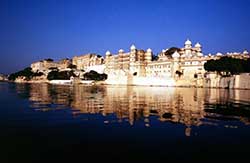 The gigantic City Palace, towering over the Pichola Lake, is the largest palace complex in Rajasthan. It extends a considerable distance along the east bank of the lake. South of the palace, a pleasant garden runs down to the shore. The original structure was built in the sixteenth century. Thereafter, each successive generation of rulers in Udaipur made its architectural mark on the City Palace complex. By the end of the nineteenth century the Maharana's Palace was a city in itself, with storehouses, stables, wells and farms within it's walls. Inspite of being a conglomeration of buildings added by various rulers, the palace complex manages to retain a surprising integrity of design. The palace has numerous balconies, towers and cupolas and there are stunning views over the lake and the city from the upper terraces.
The gigantic City Palace, towering over the Pichola Lake, is the largest palace complex in Rajasthan. It extends a considerable distance along the east bank of the lake. South of the palace, a pleasant garden runs down to the shore. The original structure was built in the sixteenth century. Thereafter, each successive generation of rulers in Udaipur made its architectural mark on the City Palace complex. By the end of the nineteenth century the Maharana's Palace was a city in itself, with storehouses, stables, wells and farms within it's walls. Inspite of being a conglomeration of buildings added by various rulers, the palace complex manages to retain a surprising integrity of design. The palace has numerous balconies, towers and cupolas and there are stunning views over the lake and the city from the upper terraces.
The main part of the palace has now been preserved as a museum. It has a large and varied collection of artifacts. The museum includes the Bari Mahal, which has a lovely central garden. The Mor Chowk with it's beautiful mosaics of peacocks; the Manak Mahal with it's collection of glass and porcelain figures and the Krishna Vilas with it's fine collection of miniatures are a treat not to be missed. The Zenana Mahal (The women's private living quarters in a palace) also has a collection of paintings. If one wants to see examples of beautiful mirror-work then a visit to the Moti Mahal is a must. The Chini Mahal is covered in beautiful oriental tiles.
Lake Pichola
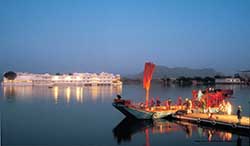 This lake is the centre-piece around which Udaipur revolves. It started off as a small pond built by a banjara, who dammed up the waters of a mountain stream by building a dyke. Maharana Udai Singh extended this pond, creating the exquisite Lake Pichola. The lake lies to the immediate west of the ridge on which the City Palace of Udaipur stands. Maharana Udai Singh built a masonry dam, known as Badi Pol, and the lake is now 4 km long and 3 km wide. Amusingly, the water of the lake belongs to the Government of India whilst the land under water belongs to the royal family.
This lake is the centre-piece around which Udaipur revolves. It started off as a small pond built by a banjara, who dammed up the waters of a mountain stream by building a dyke. Maharana Udai Singh extended this pond, creating the exquisite Lake Pichola. The lake lies to the immediate west of the ridge on which the City Palace of Udaipur stands. Maharana Udai Singh built a masonry dam, known as Badi Pol, and the lake is now 4 km long and 3 km wide. Amusingly, the water of the lake belongs to the Government of India whilst the land under water belongs to the royal family.
Sahelion ki Bari
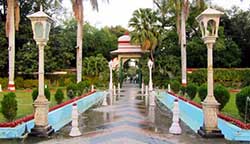 In the north of the city, about 3km from Lal Ghat, the Saheliyon-ki-Bari was built by Sangram Singh II in 1710. This small, quaint ornamental garden was laid out for the enjoyment of 48 women attendants who came as part of a princess’s dowry and has beautiful, well-maintained fountains (water shortages permitting), kiosks, marble elephants and a delightful lotus pool.
In the north of the city, about 3km from Lal Ghat, the Saheliyon-ki-Bari was built by Sangram Singh II in 1710. This small, quaint ornamental garden was laid out for the enjoyment of 48 women attendants who came as part of a princess’s dowry and has beautiful, well-maintained fountains (water shortages permitting), kiosks, marble elephants and a delightful lotus pool.
Sajjan Garh
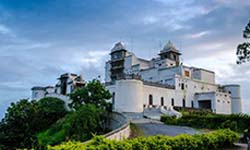 Perched on top of a distant mountain like a fairy-tale castle, this melancholy, neglected late 19th-century palace was constructed by Maharana Sajjan Singh. Originally an astronomical centre, it became a monsoon palace and hunting lodge. Now government owned, it is recently been restored and renovated so now visitors stream up here for the marvellous views, particularly at sunset. It’s 5km west of the old city as the crow flies, about 9km by the winding road.
Perched on top of a distant mountain like a fairy-tale castle, this melancholy, neglected late 19th-century palace was constructed by Maharana Sajjan Singh. Originally an astronomical centre, it became a monsoon palace and hunting lodge. Now government owned, it is recently been restored and renovated so now visitors stream up here for the marvellous views, particularly at sunset. It’s 5km west of the old city as the crow flies, about 9km by the winding road.
Pratap Smarak
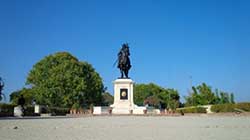 A statue of the legendary Rajput warrior Maharana Pratap, who frequently defied the Mughals, is situated atop Moti Magri overlooking Fateh Sagar. The way to the top passes through elegant gardens, including a rock garden in the distinctive Japanese style. The park is open to the public from 9 am to 6 pm.
A statue of the legendary Rajput warrior Maharana Pratap, who frequently defied the Mughals, is situated atop Moti Magri overlooking Fateh Sagar. The way to the top passes through elegant gardens, including a rock garden in the distinctive Japanese style. The park is open to the public from 9 am to 6 pm.
Shilpgram
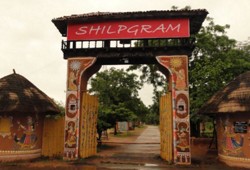 Three km west of Fateh Sagar is an interesting place called Shilpgram, a crafts village with traditional houses from four states-Rajasthan, Gujarat, Goa and Maharashtra. Daily demonstrations by musicians, dancers or artisans from various states are held here. Camel or horse rides are available here. It's open daily from 9 am to 6 pm. There's no public transport to Shilpgram, so you'll have to take an auto-rickshaw or taxi, or you'll have to rent a bicycle.
Three km west of Fateh Sagar is an interesting place called Shilpgram, a crafts village with traditional houses from four states-Rajasthan, Gujarat, Goa and Maharashtra. Daily demonstrations by musicians, dancers or artisans from various states are held here. Camel or horse rides are available here. It's open daily from 9 am to 6 pm. There's no public transport to Shilpgram, so you'll have to take an auto-rickshaw or taxi, or you'll have to rent a bicycle.
Ahar
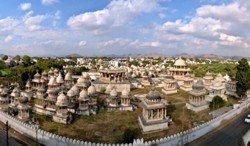 About 3km east of the old city, at Ahar, is Udaipur’s royal cremation ground , with 372 cenotaphs of maharanas and queens of Mewar forming a spectacular city of snowy domes built over 400 years.
About 3km east of the old city, at Ahar, is Udaipur’s royal cremation ground , with 372 cenotaphs of maharanas and queens of Mewar forming a spectacular city of snowy domes built over 400 years.
The beautiful Ayad Jain Temple , 300m back towards Udaipur, is also well worth a look while you are here. Ahar was also the site of ancient settlement that predated Udaipur by three-and-a-half millennia. Just 150m along the road from the royal cremation ground, the Ahar Government Museum contains copper and pottery objects more than 3300 years old, plus sculptures of Hindu gods and tirthankars (great Jain teachers) from the 8th to 16th centuries AD.
The Durbar Hall
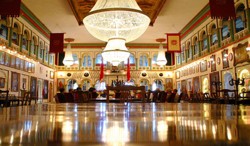 India's most impressive, with a sumptuous interior boasting some of the largest chandeliers in the country. In 1909 Maharana Fateh Singh invited Lord Minto, the then viceroy of India, to lay the foundation stone of the Durbar Hall. Also called Minto Hall in his honour, the majestic hall once hosted formal court gatherings, state banquets and royal weddings. Numerous old paintings, weapons and grand portraits of former Maharanas of Mewar adorn the walls of this hall. The top floor of this high ceiling hall, where the crystal collection is now housed, was the viewing gallery, from where the ladies of the palace, used to watch in veiled seclusion, the special functions happening in the Durbar Hall below. Today painstakingly restored, the size, splendour and capacity of this hall makes it an ideal venue for hosting special functions such as conferences or social gatherings.
India's most impressive, with a sumptuous interior boasting some of the largest chandeliers in the country. In 1909 Maharana Fateh Singh invited Lord Minto, the then viceroy of India, to lay the foundation stone of the Durbar Hall. Also called Minto Hall in his honour, the majestic hall once hosted formal court gatherings, state banquets and royal weddings. Numerous old paintings, weapons and grand portraits of former Maharanas of Mewar adorn the walls of this hall. The top floor of this high ceiling hall, where the crystal collection is now housed, was the viewing gallery, from where the ladies of the palace, used to watch in veiled seclusion, the special functions happening in the Durbar Hall below. Today painstakingly restored, the size, splendour and capacity of this hall makes it an ideal venue for hosting special functions such as conferences or social gatherings.
Crystal Gallery
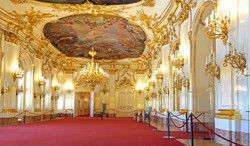 The staggering collection of crystal which is housed in what was earlier the ladies viewing gallery, was ordered by Maharana Sajjan Singh in 1877. At that time the Birmingham based company F & C Osler had a showroom in Calcutta and it was from here that Maharana Sajjan Singh got his inspiration. He however died before the shipment could arrive from England. Much of the crystal remained packed in cases and it was only in 1994 that it was arranged and opened for public display in its entirety. The variety of crystal objects d'art includes fountains, vases, crockery and furniture. What is amazing about this collection is the ethnicity of the designs. There are objects in crystal that are distinctly Indian in conception like the lotas or drinking water vessels and chuskies or small decanters. Alongside this fascinating range of crystal are exhibited silver beds, chairs and brocade and velvet seating.
The staggering collection of crystal which is housed in what was earlier the ladies viewing gallery, was ordered by Maharana Sajjan Singh in 1877. At that time the Birmingham based company F & C Osler had a showroom in Calcutta and it was from here that Maharana Sajjan Singh got his inspiration. He however died before the shipment could arrive from England. Much of the crystal remained packed in cases and it was only in 1994 that it was arranged and opened for public display in its entirety. The variety of crystal objects d'art includes fountains, vases, crockery and furniture. What is amazing about this collection is the ethnicity of the designs. There are objects in crystal that are distinctly Indian in conception like the lotas or drinking water vessels and chuskies or small decanters. Alongside this fascinating range of crystal are exhibited silver beds, chairs and brocade and velvet seating.
Jagdish Temple
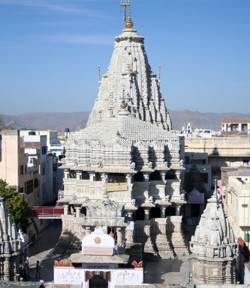 Jagdish Temple is one of the famous temples of Udaipur. Located in the City Palace complex of Udaipur, this temple is made in the Indo-Aryan style of architecture. In 1651, Jagdish temple was built by Maharana Jagat Singh, who ruled Udaipur during 1628-53. The temple is dedicated to Lord Vishnu (Laxmi Narayan), the preserver of the Universe. It is celebrated for being the largest temple in the city of Udaipur. The gateway of this temple can be sited at a distance of 150 meters from the Bara Pol of the City Palace.
Jagdish Temple is one of the famous temples of Udaipur. Located in the City Palace complex of Udaipur, this temple is made in the Indo-Aryan style of architecture. In 1651, Jagdish temple was built by Maharana Jagat Singh, who ruled Udaipur during 1628-53. The temple is dedicated to Lord Vishnu (Laxmi Narayan), the preserver of the Universe. It is celebrated for being the largest temple in the city of Udaipur. The gateway of this temple can be sited at a distance of 150 meters from the Bara Pol of the City Palace.
This three-storied temple is a wonder of architecture that comprises beautifully carved pillars, decorated ceilings, painted walls and lush halls. In those times, 1.5 million rupees were spent to raise this structure. The spire of the main temple is around 79 feet high that undoubtedly dominates the skyline of Udaipur. This shikhar (spire) is festooned with sculptures of dancers, elephants, horsemen and musicians making it truly a sight to behold.
As and when you approach the temple, you will be welcomed by two huge stone elephants at the entrance. On the very front of the temple, you would find a stone slab that is imprinted with the inscriptions with reference to Maharaja Jagat Singh. To reach the main shrine, you have to take a marble flight of 32 steps. Here, you will find a brass image of Garuda, a figure of half-man and half-eagle. This huge idol stands as if; it is guarding the doorway of Lord Vishnu.
Fateh Sagar
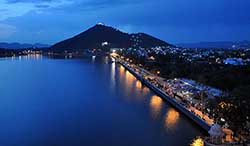 North of Pichola Lake, this water body is overlooked by a number of hills and parks. It was originally built in 1678 by Maharana Jai Singh, but reconstructed by Maharana Fateh Singh after heavy rains destroyed the dam. A pleasant drive winds along the east bank and in the middle is Nehru Park, a popular garden island with a cafe shaped like a boat. You can get there by boat from near the bottom of Moti Magri. Paddle boats are available. You can also enjoy a speed boat ride or water scooter ride in Fateh Sagar.
North of Pichola Lake, this water body is overlooked by a number of hills and parks. It was originally built in 1678 by Maharana Jai Singh, but reconstructed by Maharana Fateh Singh after heavy rains destroyed the dam. A pleasant drive winds along the east bank and in the middle is Nehru Park, a popular garden island with a cafe shaped like a boat. You can get there by boat from near the bottom of Moti Magri. Paddle boats are available. You can also enjoy a speed boat ride or water scooter ride in Fateh Sagar.
Jagmandir Palace
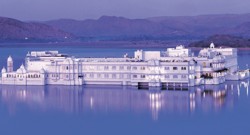 An island palace, its construction was begun by Maharana Karan Singh, but it takes it's name from Maharana Jagat Singh (1628-1652) who added to it a zenana (women's quarters) and named the island Jag Mandir in honour of himself. Made of the finest yellow sandstone inlaid with marble, it has been dedicated to Lord Jagannath, the Lord of the Universe. The place is available for holding various social functions such as parties and receptions and even marriages! In fact a lot of westerners come to get married at this place.
An island palace, its construction was begun by Maharana Karan Singh, but it takes it's name from Maharana Jagat Singh (1628-1652) who added to it a zenana (women's quarters) and named the island Jag Mandir in honour of himself. Made of the finest yellow sandstone inlaid with marble, it has been dedicated to Lord Jagannath, the Lord of the Universe. The place is available for holding various social functions such as parties and receptions and even marriages! In fact a lot of westerners come to get married at this place.
Bagore-ki-Haveli
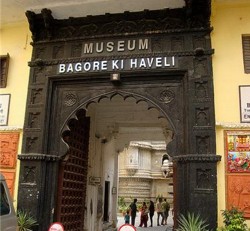 This gracious 18th-century haveli, set on the water’s edge in the Gangaur Ghat area, was built by a Mewar prime minister and has since been carefully restored. There are 138 rooms set around courtyards, some arranged to evoke the period during which the house was inhabited, while others house cultural displays, including – intriguingly enough – the world’s biggest turban. Every evening you can enjoy a cultural show from 7pm to 8pm.
This gracious 18th-century haveli, set on the water’s edge in the Gangaur Ghat area, was built by a Mewar prime minister and has since been carefully restored. There are 138 rooms set around courtyards, some arranged to evoke the period during which the house was inhabited, while others house cultural displays, including – intriguingly enough – the world’s biggest turban. Every evening you can enjoy a cultural show from 7pm to 8pm.
Sunset Point & Machla Magra
 Sunset Point & Machla Magra
The small Sunset Point Park has dazzling views over Lake Pichola, Jagmandir Island and off toward the Sajjan Garh (Monsoon Palace). It’s about 1.5km south from the Rangniwas Palace Hotel on Lake Palace Rd. Opposite the park is the lower station of the Ropeway , a cable car which swings over to Machla Magra hill where the views are even more expansive. Boat trips on the lake are available, a cheaper alternative to those offered in the City Palace complex.
Atop Machla Magra are a Karni Mata Temple and the sparse remains of the Eklingarh Fort. You can also walk up by a zigzag path from the park on the east side of pretty Dudh Talai lake, which you pass en route to Sunset Point.
Sunset Point & Machla Magra
The small Sunset Point Park has dazzling views over Lake Pichola, Jagmandir Island and off toward the Sajjan Garh (Monsoon Palace). It’s about 1.5km south from the Rangniwas Palace Hotel on Lake Palace Rd. Opposite the park is the lower station of the Ropeway , a cable car which swings over to Machla Magra hill where the views are even more expansive. Boat trips on the lake are available, a cheaper alternative to those offered in the City Palace complex.
Atop Machla Magra are a Karni Mata Temple and the sparse remains of the Eklingarh Fort. You can also walk up by a zigzag path from the park on the east side of pretty Dudh Talai lake, which you pass en route to Sunset Point.
Biological Park
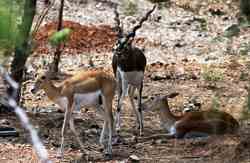 Sajjangarh Biological Park is located nearby Sajjangarh Wildlife Sanctuary at outskirts of Lake City, Udaipur. It is only 6 k.m. away from Ralway Station and Central Bus Stand. The Total area of the Biological park is 36 ha. A central ring road runs within the Park and covers almost total area of the park. On the north western side of the park, there is a tar road which takes one to a historical monument Sajjangarh (Monsoon Palace).
Sajjangarh Biological Park is located nearby Sajjangarh Wildlife Sanctuary at outskirts of Lake City, Udaipur. It is only 6 k.m. away from Ralway Station and Central Bus Stand. The Total area of the Biological park is 36 ha. A central ring road runs within the Park and covers almost total area of the park. On the north western side of the park, there is a tar road which takes one to a historical monument Sajjangarh (Monsoon Palace).
Udaipur Ropeway
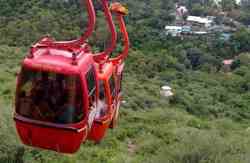 Karni Mata Temple is a popular tourist spot due to the thrilling journey uphill via a ropeway. Start this once-in-a-lifetime experience by hopping on a cable car which gives a ride all the way uphill. Spend quality time enjoying the magnificent view of the beautiful city. If you are a nature lover, you can enjoy one of the most ravishing sunsets from the viewing platform in the evenings.
Karni Mata Temple is a popular tourist spot due to the thrilling journey uphill via a ropeway. Start this once-in-a-lifetime experience by hopping on a cable car which gives a ride all the way uphill. Spend quality time enjoying the magnificent view of the beautiful city. If you are a nature lover, you can enjoy one of the most ravishing sunsets from the viewing platform in the evenings.
Contact Us
- Balbir Niwas
88, Indraprasth Nagar, Sector-14, Hiran Magri,
Udaipur (Raj.) 313002, India - +91- 9414162201 (Mr.Jasmeet Singh)
- +91- 9414162200 (Mr. Harpreet Singh)
- balbirniwas@gmail.com
- www.balbirniwas.com


